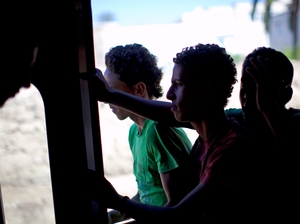
Jewish Boukha (fig brandy) : a national tipple at risk from Islamists
The Jews brought fig brandy to Tunisia, where its popularity has made it a national original. Now, however, Islamists are trying to make alcohol sales taboo. NPR reports:
Almost everywhere we've been, we've heard stories of bars and liquor stores forced to close.
News of all this has spread to bars that remain open — like a dim dive in Tunis called JFK. Here, political activist Ramy Sghayer sipped a beer while "Killing Me Softly" played on the sound system.
He finds his friends here, along with green bottles of Celtia, a Tunisian-made beer, which the bartender opens one-handed by knocking them against the side of the table.
The bar is conveniently near the place where protesters, including Sghayer, brought down Tunisia's ruler last year.
NPR Music features some of the music Morning Edition host Steve Inskeep is hearing along his travels through Tunisia, Libya and Egypt — in cafes, clubs and on local radio stations.
"I respect these people as citizens that have the right, for example, to exist," he says. "But I don't respect their ideas because we want our country to advance, not to go back in history."
Sghayer is no fan of the moderate Islamist party now in power, Ennadha, though it should be noted that the government is not calling for a ban on alcohol.
Sghayer thinks that even Islamists wouldn't dare.
What role does alcohol play in this country's culture and in its life?
"It's fundamental," he says. "You cannot abolish alcohol in Tunisia. Tunisian people are breathing oxygen and alcohol."
Since Tunisia's revolution, the company that brews Celtia has reported sales have actually increased.
And that company is a state-run enterprise. That means that technically the Islamist party now dominating the government is in the brewing business.
We decided to pour one more drink in a more contemplative place.
It's the business of Jacob LaLoush, who says he runs the only kosher restaurant in Tunis. He returned to his native Tunisia after spending years abroad in Paris.

Children ride the train, hopping in and out of the open doors, from Tunis to the suburb of Sidi Bou Said.
"I divorced there and I came back here because I have a Jewish mother. You heard about the Jewish mother?" he asks.
We wanted to know about his restaurant, which he now runs with his mother.
He's part of a shrinking Jewish community in Tunisia, which used to be substantial, but now numbers fewer than 2,000. Jews were among many waves of people who've come to this spot on the Mediterranean coast.
"The people here come from all over the Mediterranean countries," he says. "All the people who arrived here brought with them their traditions, their recipes."
His menu draws on everything from Middle Eastern traditions to foods brought centuries ago from Spain by Sephardic Jews.
The menu also includes a Tunisian original — a drink made from figs, called bukha.
"It's a kind of Tunisian vodka. It was the basic drink in all the Jewish feasts," says LaLoush, who cannot drink any more because of medication.
And non-Jews have come to drink what's become known as a distinctive Tunisian national product. He goes to the freezer and comes back with shot glasses and a small green bottle, white with frost.
"When I put this bottle on my table I feel free," he says.
NPR is mad that their own vacations will be soured. They're all in favor of pogroms though.
ReplyDelete